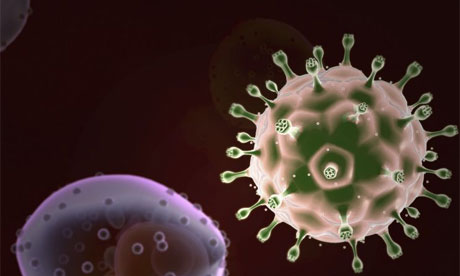
Researchers have developed a new "assassin cell" therapy for treating HIV which involves engineering the patient's own immune system to fight the virus more effectively.
The therapy – which has proved effective in laboratory tests using human cell cultures – will be tested in a clinical trial of 35 patients with advanced HIV infection that is due to start next summer.
Efforts to find a traditional vaccine against HIV – the virus that causes Aids – have so far drawn a blank. "HIV mutates so quickly," said Dr Bent Jakobsen at Adaptimmune, the company in Oxford that is developing the new approach. "Gradually it gets better and better at escaping the detection of the immune system."
Jakobsen and his colleagues began to pursue a different approach after investigating a patient who had resisted his HIV infection particularly effectively. "When we tested the T cells from this patient, it looked as if he was responding to a number of those variants that normally escape the immune system," he said.
T cells are components of the immune system that attack and destroy cells within the body that are infected. They recognise components of the virus – antigens – that are displayed on the outside of infected cells. In this patient, the T cell receptor protein seemed particularly good at recognising HIV antigens.
The team isolated the receptor protein and then improved its ability to recognise HIV further by randomly mutating it.
Treating patients will involve taking a blood sample and adding an engineered virus containing genes for the improved T cell receptor. The patient's own T cells then take up the genes and so are equipped with the improved receptor. These cells are then injected back into the patient.
The result was a T cell receptor that binds to HIV 450 times more strongly. The study was published yesterday in Nature Medicine.
"In the face of our engineered assassin cells, the virus will either die or be forced to change its disguises again, weakening itself along the way," said Prof Andy Sewell from Cardiff University.
"Because the immune cells work so much better when they have this modified antigen receptor they can eliminate the virus. And the mutants that normally escape detection are also recognised and eliminated," Jakobsen said. "That's not to say that will happen in patients. HIV is incredibly difficult to deal with. But it does give hope that it will do much more than the immune system does against the virus."
The search for a vaccine has not gone smoothly. Last year a major trial of an experimental vaccine developed by Merck was abandoned and during the summer work on another vaccine candidate was shelved.
The clinical trial of 35 patients next summer will take place at the University of Pennsylvania in Philadelphia.

